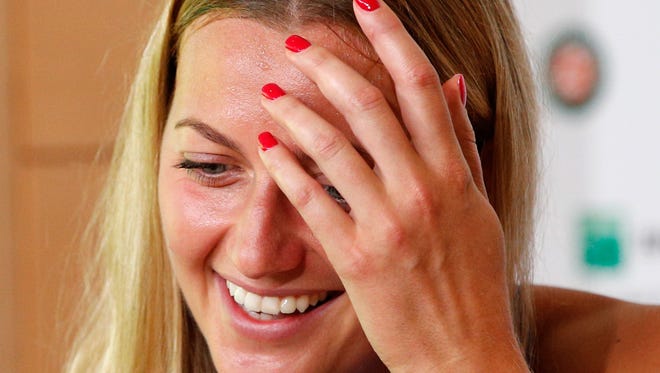Petra Kvitova gets emotional discussing return to tennis after attack
PARIS — The player considered the most unlikely to compete at this year’s French Open had to be Petra Kvitova, who sustained serious left hand wounds when fighting off a knife-wielding intruder at her Prostejov, Czech Republic home just days before Christmas.

But just five months after the Dec. 20, 2016 attack — she had surgery later that day — the 15th-seeded southpaw is here in Paris, racket in hand, and ready to face American Julia Boserup in the first round.
Kvitova, a two-time Wimbledon champion, clearly operates with an optimistic outlook on life. Despite her surgeon, Dr. Radek Kebrie, carefully warning her after the three-hour, 45-minute procedure her playing days could be over, she believed the day would come when she was back on court.
Even with the operation being deemed a success, and hand therapy results offering a continued promising picture, everyone involved proceeded with caution. The earliest timeline for her return would be an encouraging six months. That, however, didn’t keep Kvitova from signing up for the French Open despite it being only five months from the incident.
On Friday, the 27-year-old Kvitova was emotional throughout a 15-minute news conference at Roland Garros.
RELATED:
Petra Kvitova injured by knife-wielding attacker at her home
Petra Kvitova released from hospital after knife attack
Petra Kvitova's recovery going well; reward offered for attacker
“Not many people believe that I can play tennis again,” said Kvitova, smiling as her voice cracked. “So I’m happy that I can play. I actually already won my biggest fight. I’m happy that I like challenges. That was one of the biggest, of course. So I stayed in life and I have all my fingers.
“I felt like the tennis was taken away from me, and it wasn’t my decision,” she added. “Suddenly I couldn’t do what I love. I see life a little bit from [a] different angle [now].”
There’s no denying Kvitova is receiving more than a few double takes at Roland Garros. Even fellow players didn’t anticipate she’d be participating at this Grand Slam, many were surprised to hear she was on-site.
“She's in the draw?” said seventh seed Johanna Konta. “I didn't know. Actually, that's really good news. Oh, that's so nice.”
There was a good news-bad news component to Kvitova’s wounds — all five fingers were injured, but it was a clean cut and only two of the fingers suffered digital nerve damage.
Kvitova’s hand was in a splint for eight weeks, although she started doing hand rehabilitation only two days after the surgery. By the end of February, she was playing table tennis and badminton and doing shadow tennis swings. At the 12-week mark, Kvitova was cleared to take up a tennis racket slowly, and by the beginning of May she was ensconced at her Monte Carlo home and practicing on the clay courts.
Kvitova admitted that the terrifying incident did set her nerves on edge, but she’s coped with help from loved ones. She is unable to discuss the actual incident because of the continued police investigation, and to date there’s been no arrest related to her attack.
“I didn’t sleep well the days after, but I wasn’t really staying alone,” she said. “I have been always with my family or with my coaches or with friends. I don’t really have nightmares. From the beginning I was really feeling really weird when I went in the city or somewhere, I was always staring to the guys and looking if there are no strangers there. But with time, it’s better. Of course, I’m more actively watching the people around me.”
Since therapy wasn’t going to fill all the hours of the day during her recuperation, Kvitova decided to enroll at the University of Jan Amos Komensky where she is continuing to study communications and social media. She even joked with journalists, “Maybe I will be one of you, then, someday.”
Choosing to view this as a “second chance” to play tennis with the understanding it’s an opportunity that might not have happened and needs to be cherished, she’s making a big deal of her return. One way she’s commemorating the special moment is that her family — parents Jiri and Pavla, and brothers Jiri and Libor, will be sitting courtside watching her first match back.
“It was a last minute decision,” she said of playing in Paris. “I have to start somewhere. I know it’s a Grand Slam, but it’s good practice. For me right now, it’s not like a Grand Slam. When I step on the court it will be something really different compared to anything.”